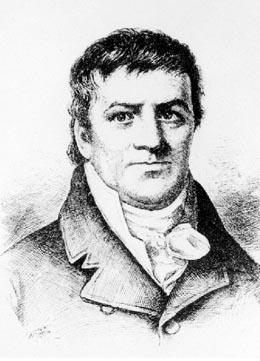On June 18, 1812, the U.S. Congress votes to declare war on Great Britain, and President James Madison (1751-1836) signs a Proclamation of War. New York entrepreneur John Jacob Astor (1763-1848) realizes that the outbreak of hostilities may have serious consequences for his Pacific Fur Company's operations on the Columbia River in present-day Washington and Oregon.
President Madison’s main rationales for deciding to go to war were Britain's interference with international trade between the United States and Europe, and the Royal Navy’s practice of stopping American cargo ships on the high seas and impressing American sailors into service.
Danger for the Pacific Northwest Fur Trade
Although many U.S. businessmen welcomed the news, John Jacob Astor was greatly concerned about the effect the war would have on his fledgling fur operations on the Northwest coast. “As soon as war was declared I considered Columbia in danger if not lost,” he wrote later (Ronda, 251).
First of all, the trading post of Fort Astoria, near the mouth of the Columbia, would be highly vulnerable to attack by the British Navy. Secondly, he had dispatched the ship Beaver the previous October with supplies and reinforcements for Fort Astoria, but he had not heard whether she had arrived safely. If she were still at sea, she ran the risk of being seized by a British warship. Furthermore, any future shipments would face grave danger. "He perceived at once the peril of the case. The harbor of New York would doubtless be blocked, and the departure of the annual supply ship in the autumn prevented; or, if she should succeed in getting out to sea, she might be captured on her voyage" (Irving, 429).
Intrigue and Anxious Waiting
From his headquarters in New York, Astor worked quickly to protect his Northwest enterprise, writing that he was "wishing to save it as I wished to save my life" (Ronda, 251). He sent a message to Canton, hoping to intercept the captain of the Beaver there with orders to sail at once for the Columbia to inform the Astorians about the outbreak of war and to help defend the post.
In the hope of resupplying his Northwest posts with trade goods and other necessities, he devised a strategy to circumvent the British blockade. He sent two employees to London, where they were to act undercover to buy a ship, stock it with supplies, and sail for the Columbia under a neutral flag. "What Astor set in motion was an extraordinary intrigue whose results would not be known for nearly two years" (Ronda, 252).
Having done everything he could think of, Astor faced months of anxiety before he would receive any news of the fate of his partners on the Northwest coast. Washington Irving (1783-1859), who interviewed Astor extensively for his book Astoria, described this period of waiting: "Week after week and month after month elapsed, without anything to dispel the painful incertitude that hung over every part of this enterprise" (Irving, 432).
Months would pass before Astor learned that his efforts to assist the Astorians had all proved ill-fated. The Beaver's captain, fearful of encountering the Royal Navy, ignored Astor's entreaties to return to the Columbia. Astor's envoys to England did succeed in purchasing a ship and supplies for Astoria, but during a stopover in Hawaii her crew mutinied and she never reached the Columbia River. The Pacific Fur Company partners in the Northwest, despairing of receiving support by sea, decided to sell their holdings to the North West Company and return overland to New York.

